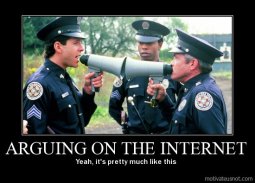May 10 2018
False Dichotomy and Science Denial

Psychologist Jeremy Shapiro has an interesting article on RawStory in which he argues that one of the pillars of science denial is the false dichotomy. I agree, and this point is worth exploring further. He also points out that the same fallacy in thinking is common in several mental disorders he treats.
The latter point may be true, but I don’t see how that adds much to our understanding of science denial, and may be perceived as inflammatory. For example, he says that borderline personality disorder clients often split the people in their world into all bad or all good. If you do one thing wrong, then you are a bad person. Likewise, perfectionists often perceive that any outcome or performance that is less than perfect gets lumped into one category of unsatisfactory.
I do think these can be useful examples to show how dichotomous thinking can lead to or at least support a mental disorder. Part of the goal of therapy for people with these disorders is cognitive therapy, to help them break out of their pattern of approaching the world as a simple dichotomy. But we have to be careful not to imply that science denial itself is a mental illness or disorder.
Denialism and False Dichotomy
A false dichotomy is a common logical fallacy in which many possibilities, or a continuum of possibilities, is rhetorically collapsed into only two choices. People are either tall or short, there is no other option. There are just Democrats and Republicans.

 In 1968, 50 years ago, Paul Ehrlich and his wife published The Population Bomb, which famously predicted mass starvation by the end of the next decade. Ehrlich’s predictions failed largely because of the green revolution, the dramatic increase in agricultural productivity. You would think that being famous for a dramatically failed prediction would bring humility, but Ehrlich is still at it.
In 1968, 50 years ago, Paul Ehrlich and his wife published The Population Bomb, which famously predicted mass starvation by the end of the next decade. Ehrlich’s predictions failed largely because of the green revolution, the dramatic increase in agricultural productivity. You would think that being famous for a dramatically failed prediction would bring humility, but Ehrlich is still at it.  It has rapidly become conventional wisdom that the widespread use of social media has resulting in an increase in the “echochamber effect.” This results from people only consuming media that already is in line with their existing beliefs and ideology. This is nothing new, psychologists have long documented that people are much more likely to access information that reinforces their existing beliefs and biases, and much less likely to engage with information that directly challenges their beliefs.
It has rapidly become conventional wisdom that the widespread use of social media has resulting in an increase in the “echochamber effect.” This results from people only consuming media that already is in line with their existing beliefs and ideology. This is nothing new, psychologists have long documented that people are much more likely to access information that reinforces their existing beliefs and biases, and much less likely to engage with information that directly challenges their beliefs. Three weeks ago
Three weeks ago  In general, which demographic is more supportive of free speech, a college student who identifies as an extreme liberal, or a non-college educated conservative? How has overall support for free speech, even “politically incorrect” speech, changed over the last few decades? The answers to these questions may seem obvious, and that’s the point, because the actual facts run contrary to common perception.
In general, which demographic is more supportive of free speech, a college student who identifies as an extreme liberal, or a non-college educated conservative? How has overall support for free speech, even “politically incorrect” speech, changed over the last few decades? The answers to these questions may seem obvious, and that’s the point, because the actual facts run contrary to common perception. Why do people argue so much in the comments on social media platforms? That question has given rise to a new area of social psychology, but a partial answer, I think, rests on several principles of critical thinking.
Why do people argue so much in the comments on social media platforms? That question has given rise to a new area of social psychology, but a partial answer, I think, rests on several principles of critical thinking. The
The  This aphorism has been around since about 1600,
This aphorism has been around since about 1600,  A recent JAMA article
A recent JAMA article In North America house sparrows are a menace.
In North America house sparrows are a menace. 




